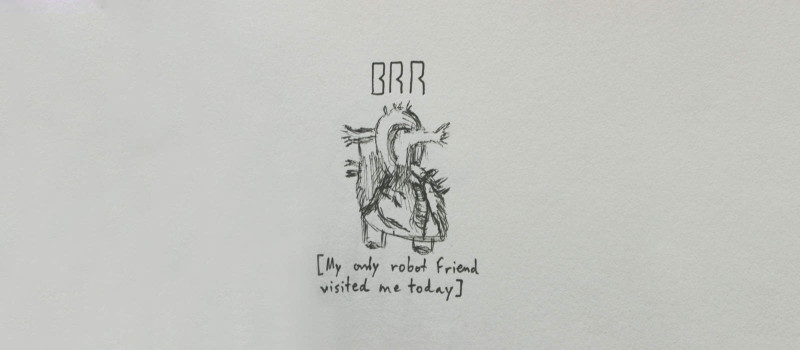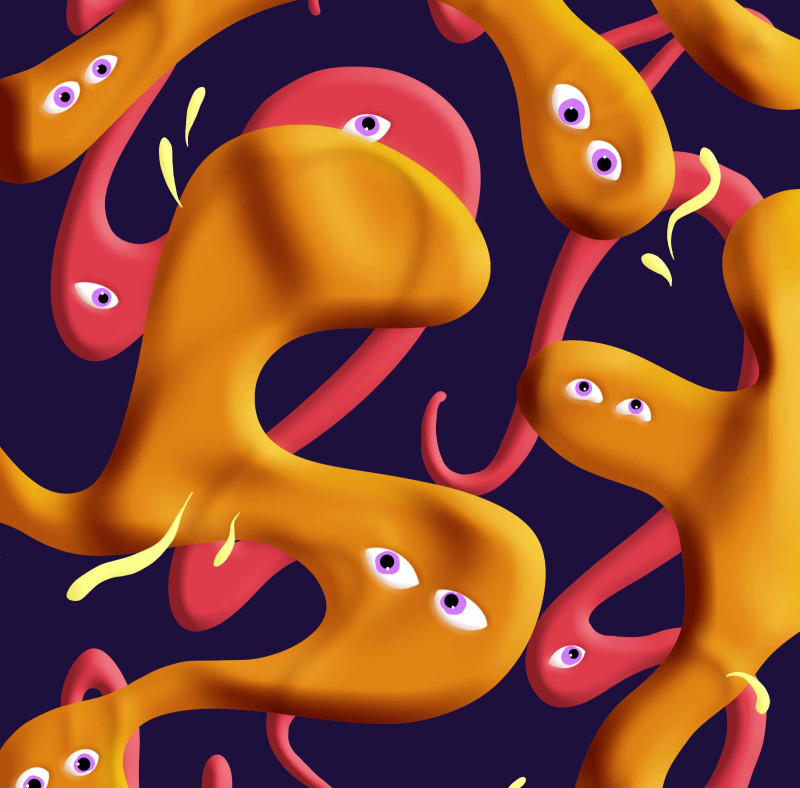BRR
Does a video game need visuals to be considered a video game? Can you tell a story without images? Two questions that Brr answers with a resounding “yes”.
Created as part of a no-visual game jam, Brr offers limited interactivity. There’s just one simple mechanic: press spacebar to brr. In doing so, players fill in the blanks during the conversation that ensues, interpreting the meaning of brr how they see fit.
What starts as idle chit chat, quickly develops into a deep and earnest conversation about feelings of insecurity and self-doubt. The game features personal pieces of poetry and freeform writing and offers a unique window into the mental state of the creator at the time they wrote it.
About the developer
Vaida Plankytė has a degree in Artificial Intelligence and Computer Science from the University of Edinburgh. They love to experiment with game design and storytelling, and often uses their own life as inspiration for their games.

Interview with Vaida Plankyte
At one point in the game, you describe how you felt when you wrote a particular poem. Do you remember how you felt when you created Brr?
I was doing this thing called One Game a Month where I was focussing on one idea to create a game. Most of the time I created the things I wanted, but when I didn’t have any ideas I was looking at what kind of jams were running at that time. The No Screen jam then prompted the idea of a game about listening and empathy for someone else, without any visuals. That became Brr.
It’s a game about having a conversation with a robot. Is there a reason why you chose a robot?
I think it’s not super important. It was more of a metaphor for the idea of getting inside your own head, constantly thinking through your sadness without being able to get yourself out of it. I needed to have something that doesn’t really answer but lets you get inside these thought loops, and the robot was almost like a visual thing. Also, I was creating brr sounds in the chiptune editor and figured “oh, I guess it’s a robot now.”
With One Game a Month I kind of have an idea and start building things, but sometimes I’m not realising what I’m doing until I’ve actually done it and look back on it.
You mentioned replaying the game recently. What was that like?
I created it six years ago and I didn’t really play it a lot because, you know, it’s quite sad. I do feel a sense of pride, like, you know “this was pretty good!”. There are a lot of parts that I don’t remember and get surprised by. There are things that I designed in the past to be surprising, so it’s interesting to actually be the one to experience those moments.
The character you’re talking to - you - feels stressed, struggling with time management and scheduling, or fulfilling the role that is expected of them. Did that come as part of the pressure of doing One Game a Month?
At the time I think I was feeling overwhelmed with a lot of personal things. Actually, One Game a Month felt quite liberating, a creative outlet which made me feel like I had an identity outside of academia. But eventually, when I was reaching the harder stages of university I definitely burnt out on it. Because it did feel more like a task, I stopped making games for a while.
To me, insecurity seems one of the key themes of the game. How do you deal with that?
A lot of the things I was struggling with when I was making the game - workload, identity, anxiety, all of those things - I still experience now but I deal with them differently, or maybe I experience them differently. When I stopped making games for a while, I struggled a lot with my identity. Can I still attend events? Who am I outside of my university experience? I feel more secure now, and I enjoy just simply playing games with my partner.
Do you know where these issues originated? Would you consider yourself a perfectionist?
I really enjoyed game stuff as a creative outlet because I was able to not be too perfectionistic about it. Especially with One Game a Month, where you have to make a game in a few days, it was nice to focus on whatever I was feeling like and end up with this kind of weird experience that’s finished in some way.
I think the anxiety about creative output comes from moving a lot while growing up. As a result I needed some kind of identity and then I became a school nerd. That was my thing, I was good at school. Because of that I was really bad at taking a step back and prioritizing other elements of my life. That eventually affected my games stuff, just a feeling of now really knowing how to relax.
The game includes pieces of poetry and free form writing. Are they yours or were they specifically written for the game?
No, they were all just poems and writings that I had in my writing folder. I think I just kind of felt like expressing as much as myself as I could so I just put these things in. They told some aspects of what I wanted to say in a better way than me trying to design them specifically for the game.
Do you approach other creative outputs - for instance your writing - differently than making games?
I don’t feel like I have enough experience to properly compare, but I think it has more to do with the communities you engage with. With games I very much engaged with smaller creators that were doing something very similar to me. They were making weird, unpolished things and just putting them out, caring more about the experience they were making than having to conform to anything. That was really helpful in feeling validated. That I could make things just like that. With writing, I haven’t found a place like that yet.
At one point in the game you mention “The Beginner’s Guide is a horrible game”. Why do you feel that way?
It tackled a lot of issues I was dealing with at the moment and it was simply too confrontational for me at the time. It emotionally affected me so I was like “this is very bad”. For the record, I think it’s a good game.
Interview by Christophe De Bont
For more info, follow @DifferentPerspectives_Festival on Instagram
